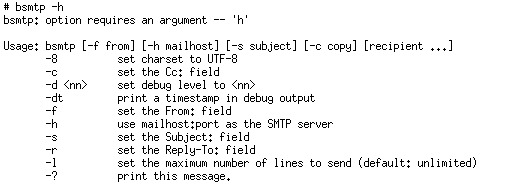Data Backups with Bacula: Notifications
Introduction
When the backup solution is already working, we can also take a look at notifications more closely. We can send a notification email for every backup, which is run during the night, to tell us whether the backup has been run successfully or not. We can decide the type of messages we would like to be sent to our email address, whereas other messages should only be logged to a local file.
Bacula uses the bsmtp Bacula's SMTP client for mail submission. If we open the bacula-dir.conf configuration file, we can see that the following bsmtp command is used to send an email. The placeholders of the mail command are replaced as follows:

What should you learn next?
- %% : %
- %c : client's name
- %d : director's name
- %e : job exit code
- %h : client address
- %i : job ID
- %j : unique job name
- %l : job level
- %n : job name
- %r : recipients
- %s : since time
- %t : job type like INFO, WARNING, ERROR, FATAL, etc
- %v : volume name
The bacula-dir.conf configuration file contains the following mailcommand directive responsible for sending emails to administrator.
[plain]
mailcommand = "/usr/sbin/bsmtp -h localhost -f "(Bacula) <%r>" -s "Bacula: %t %e of %c %l" %r”
The command line options for bsmtp are shown below. Note that there are no options to permit authentication to an SMTP server. Normally that's not needed in internal networks, but if we would like to use an external SMTP server, we need to use a different SMTP client like sendmail. From the bsmtp command we can see that it will try to connect to the SMTP server – we need to change the 'localhost' to an actual domain of our internal SMTP server.

To specify where to send the emails in Message resources we have to use the destination, which supports two syntaxes:
- destination = message-type1, message-type2, …
- destination = address = message-type1, message-type2, ...
The first syntax only has one equal sign in its command and the destination can be one of: stdout, stderr or console. Usually, the console destination is used, which sends messages to the Bacula Console, which can be displayed in bconsole program. The second syntax has two equal signs in it and supports the following destinations:
The message-type fields can be one of the following:
The Message resource taken from bacula-dir.conf is presented below, where five message directives are used starting with: mail (send all emails except skipped emails to admin@company.com), operator (send all mount messages to admin@company.com), console (send all messages except skipped/saved messages to bacula console), append (save all messages except skipped messages to /var/log/bacula/bacula.log) and catalog (send all messages to catalog).
[plain]
Messages {
Name = Standard
mailcommand = "/usr/sbin/bsmtp -h localhost -f "(Bacula) <%r>" -s "Bacula: %t %e of %c %l" %r"
operatorcommand = "/usr/sbin/bsmtp -h localhost -f "(Bacula) <%r>" -s "Bacula: Intervention needed for %j" %r"
mail = admin@company.com = all, !skipped
operator = admin@company.com = mount
console = all, !skipped, !saved
append = "/var/log/bacula/bacula.log" = all, !skipped
catalog = all
}
To test whether the mail sending is working as it should, we need to pipe the email message to the bsmtp mail client, which accepts the message from stdin. We should also specify the SMTP server localhost with -h option, 'From' header with -f option, 'Subject' header with -s option and specify the actual address we wish to send to at the end. Note that the -d 10 option enables debugging messages, where the actual SMTP commands are shown and can help us debug the unexpected problems.
[plain]
# echo "This is test message." | /usr/sbin/bsmtp -h localhost -f backup@domain.com -s "Test" user@domain.com -d 50
When messaging doesn't work at your end, you should first add the "-d 50" to your mailcommand directive in the bacula-dir.conf configuration file. You can use a configuration line as presented below, which should display debug configuration messages.
[plain]
mailcommand = "/usr/sbin/bsmtp -h mail -f mail@domain.com -s "Bacula: %t %e of %c %l" %r -d 50"
Afterwards, we have to stop the current instance of bacula-dir and start bacula-dir in debug mode by passing it the "-d 200" configuration option. Other configuration options are self-explanatory, but for completeness let's present them here: -u is used to specify the user under which Bacula will run, -g is similar except for the group and -f is used to run the daemon in foreground (as contrary to the background).
[plain]
# /etc/init.d/bacula-director stop
# /usr/sbin/bacula-dir -c /etc/bacula/bacula-dir.conf -u bacula -g bacula -d 200 -f
Next, you can run any defined backup job in bconsole and observe the messages being printed in the debug window. The outputted messages clearly state the whole communication with the mail server located at mail.domain.com. The commands sent to the mail server are presented in bold and are marked with '-->' arrows. First the HELO command is sent to identify the current system, MAIL FROM specifies mail sender, RCPT TO specifies mail recipient, DATA declares the message body and QUIT terminates the connection.
[plain]
edit_job_codes: /usr/sbin/bsmtp -h mail -f mail@domain.com -s "Bacula: %t %e of %c %l" %r -d 50
Message delivery ERROR: Mail prog: bsmtp: bsmtp.c:302-0 Debug level = 50
Message delivery ERROR: Mail prog: bsmtp: bsmtp.c:381-0 My hostname is: bacula.domain.com
Message delivery ERROR: Mail prog: bsmtp: bsmtp.c:405-0 From addr=mail@domain.com
Message delivery ERROR: Mail prog: bsmtp: bsmtp.c:445-0 Connected
Message delivery ERROR: Mail prog: bsmtp: bsmtp.c:133-0 Calling fgets on read socket rfp.
Message delivery ERROR: Mail prog: mail <-- 220 mail.domain.com ESMTP
Message delivery ERROR: Mail prog: bsmtp: bsmtp.c:143-0 mail --> 220 mail.domain.com ESMTP
Message delivery ERROR: Mail prog: bacula.domain.com --> HELO bacula.domain.com
Message delivery ERROR: Mail prog: bsmtp: bsmtp.c:133-0 Calling fgets on read socket rfp.
Message delivery ERROR: Mail prog: mail <-- 250 mail.domain.com
Message delivery ERROR: Mail prog: bsmtp: bsmtp.c:143-0 mail --> 250 mail.domain.com
Message delivery ERROR: Mail prog: bacula.domain.com --> MAIL FROM:<mail@domain.com>
Message delivery ERROR: Mail prog: bsmtp: bsmtp.c:133-0 Calling fgets on read socket rfp.
Message delivery ERROR: Mail prog: mail <-- 250 2.1.0 Ok
Message delivery ERROR: Mail prog: bsmtp: bsmtp.c:143-0 mail --> 250 2.1.0 Ok
Message delivery ERROR: Mail prog: bsmtp: bsmtp.c:489-0 rcpt to: admin@domain.com
Message delivery ERROR: Mail prog: bacula.domain.com --> RCPT TO:<admin@domain.com>
Message delivery ERROR: Mail prog: bsmtp: bsmtp.c:133-0 Calling fgets on read socket rfp.
Message delivery ERROR: Mail prog: mail <-- 250 2.1.5 Ok
Message delivery ERROR: Mail prog: bsmtp: bsmtp.c:143-0 mail --> 250 2.1.5 Ok
Message delivery ERROR: Mail prog: bsmtp: bsmtp.c:496-0 Data
Message delivery ERROR: Mail prog: bacula.domain.com --> DATA
Message delivery ERROR: Mail prog: bsmtp: bsmtp.c:133-0 Calling fgets on read socket rfp.
Message delivery ERROR: Mail prog: mail <-- 354 End data with <CR><LF>.<CR><LF>
Message delivery ERROR: Mail prog: bsmtp: bsmtp.c:143-0 mail --> 354 End data with <CR><LF>.<CR><LF>
Message delivery ERROR: Mail prog: bsmtp: bsmtp.c:503-0 From: mail@domain.com
Message delivery ERROR: Mail prog: bsmtp: bsmtp.c:506-0 Subject: Bacula: Backup OK of myclient-fd Incremental
Message delivery ERROR: Mail prog: bsmtp: bsmtp.c:534-0 Sender: bacula@bacula.domain.com
Message delivery ERROR: Mail prog: bsmtp: bsmtp.c:539-0 To: admin@domain.combsmtp: bsmtp.c:546-0
Message delivery ERROR: Mail prog: bsmtp: bsmtp.c:559-0 Date: Fri, 22 Aug 2014 13:37:11 +0200 (CEST)
Message delivery ERROR: Mail prog: bacula.domain.com --> .
Message delivery ERROR: Mail prog: bsmtp: bsmtp.c:133-0 Calling fgets on read socket rfp.
Message delivery ERROR: Mail prog: mail <-- 250 2.0.0 Ok: queued as AE7576109D
Message delivery ERROR: Mail prog: bsmtp: bsmtp.c:143-0 mail --> 250 2.0.0 Ok: queued as AE7576109D
Message delivery ERROR: Mail prog: bacula.domain.com --> QUIT
Message delivery ERROR: Mail prog: bsmtp: bsmtp.c:133-0 Calling fgets on read socket rfp.
Message delivery ERROR: Mail prog: mail <-- 221 2.0.0 Bye
Message delivery ERROR: Mail prog: bsmtp: bsmtp.c:143-0 mail --> 221 2.0.0 Bye
You've seen that the bsmtp doesn't authenticate users against the mail server and doesn't support such functionality. If mail server requires authentication, we have to use a different mail client like sendmail. At this point, we should check our inbox for messages sent by Bacula, which can be a great help when identifying whether backup jobs were run successfully or not.
At the end of debugging, we need to remove the "-d 50" parameter from the bacula-dir.conf and restart Bacula normally by using the init.d script.
[plain]
# /etc/init.d/bacula-director start
Conclusion
In this article we've presented the Bacula notification system and how it can be configured to fit our needs. We should configure the Bacula notifications to be sent to our email address, where we can easily determine whether a job has been run successfully or not. We can only send error messages generated when the backup job has failed for one reason or another, which limits the number of messages received to our inbox. My suggestion is that you send all messages when starting to use Bacula to see whether everything works as expected, and later on change the configuration file to only send failed backup jobs that need to be investigated further.
When receiving a failed backup job email, we should take proper steps to determine why the backup job has failed. We need to connect to the director and identify the failing client and the reason for failure. So far, my backup jobs failed because the file daemon on the clients was not accessible, because I forgot to configure the bacula-fd to be run during operating system boot. This is especially important for mobile devices, which will be restarted more frequently than regular server devices. Because I had a proper messaging mechanism in place, such errors were quickly discovered and mitigated, but most importantly appropriate rc.d links were created to start bacula-fd at boot time, which prevented further failures.
When in doubt, configure Bacula to send you all messages to email and gradually reconfigure the director to disable the messages of no particular importance.
References
[1] Solid-state drive, https://en.wikipedia.org/wiki/Solid-state_drive.
[2] Tape drive https://en.wikipedia.org/wiki/Tape_drive.
[3] List of backup software https://en.wikipedia.org/wiki/List_of_backup_software.
[4] Bacula-Web, http://www.bacula-web.org/.
[5] The Bootstrap File, http://www.bacula.org/5.2.x-manuals/en/main/main/Bootstrap_File.html.
[6] ESXi 5.1: Using Raw Device Mappings (RDM) on an HP Microserver,
http://forza-it.co.uk/esxi-5-1-using-raw-device-mappings-rdm-on-an-hp-microserver/.
[7] Bacula Installation and Configuration Guide, https://access.redhat.com/site/sites/default/files/attachments/install_1.pdf.
[8] Overview on modifying the Synology Server, bootstrap, ipkg etc, http://forum.synology.com/wiki/index.php/Overview_on_modifying_the_Synology_Server,_bootstrap,_ipkg_etc.
[9] Data Encryption, http://www.bacula.org/5.2.x-manuals/en/main/main/Data_Encryption.html.

FREE role-guided training plans
[10] Messages Resource, http://www.bacula.org/5.2.x-manuals/en/main/main/Messages_Resource.html.




